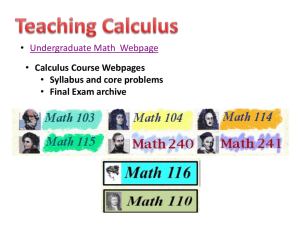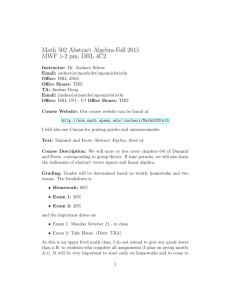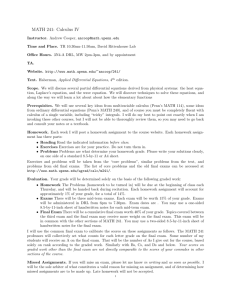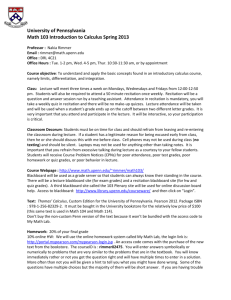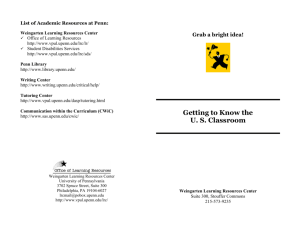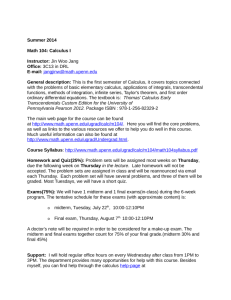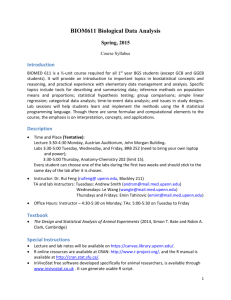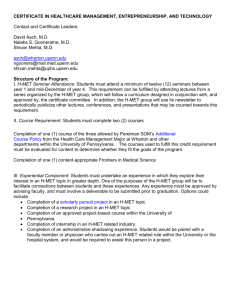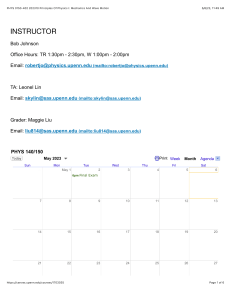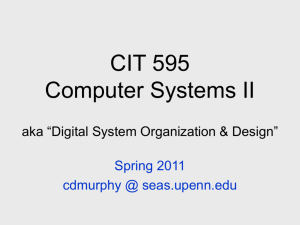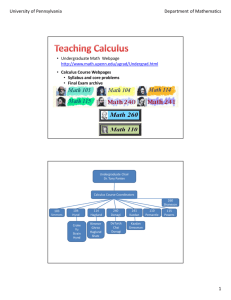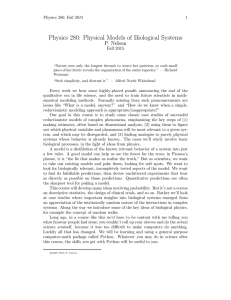University of Pennsylvania Math 170 Ideas in
advertisement
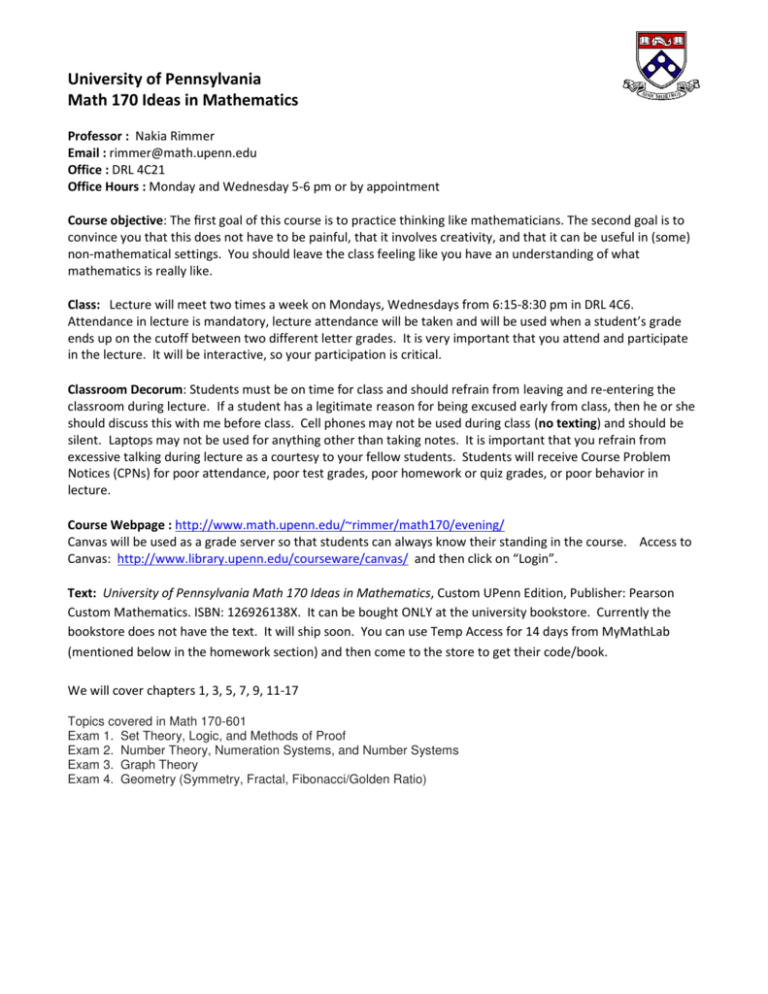
University of Pennsylvania Math 170 Ideas in Mathematics Professor : Nakia Rimmer Email : rimmer@math.upenn.edu Office : DRL 4C21 Office Hours : Monday and Wednesday 5-6 pm or by appointment Course objective: The first goal of this course is to practice thinking like mathematicians. The second goal is to convince you that this does not have to be painful, that it involves creativity, and that it can be useful in (some) non-mathematical settings. You should leave the class feeling like you have an understanding of what mathematics is really like. Class: Lecture will meet two times a week on Mondays, Wednesdays from 6:15-8:30 pm in DRL 4C6. Attendance in lecture is mandatory, lecture attendance will be taken and will be used when a student’s grade ends up on the cutoff between two different letter grades. It is very important that you attend and participate in the lecture. It will be interactive, so your participation is critical. Classroom Decorum: Students must be on time for class and should refrain from leaving and re-entering the classroom during lecture. If a student has a legitimate reason for being excused early from class, then he or she should discuss this with me before class. Cell phones may not be used during class (no texting) and should be silent. Laptops may not be used for anything other than taking notes. It is important that you refrain from excessive talking during lecture as a courtesy to your fellow students. Students will receive Course Problem Notices (CPNs) for poor attendance, poor test grades, poor homework or quiz grades, or poor behavior in lecture. Course Webpage : http://www.math.upenn.edu/~rimmer/math170/evening/ Canvas will be used as a grade server so that students can always know their standing in the course. Access to Canvas: http://www.library.upenn.edu/courseware/canvas/ and then click on “Login”. Text: University of Pennsylvania Math 170 Ideas in Mathematics, Custom UPenn Edition, Publisher: Pearson Custom Mathematics. ISBN: 126926138X. It can be bought ONLY at the university bookstore. Currently the bookstore does not have the text. It will ship soon. You can use Temp Access for 14 days from MyMathLab (mentioned below in the homework section) and then come to the store to get their code/book. We will cover chapters 1, 3, 5, 7, 9, 11-17 Topics covered in Math 170-601 Exam 1. Set Theory, Logic, and Methods of Proof Exam 2. Number Theory, Numeration Systems, and Number Systems Exam 3. Graph Theory Exam 4. Geometry (Symmetry, Fractal, Fibonacci/Golden Ratio) Homework: 30% of your final grade We will use the online homework system called My Math Lab, the login link is: http://www.pearsonmylabandmastering.com/northamerica/ . An access code comes with the purchase of the new text from the bookstore. The courseID is : rimmer18345. For details on creating a My Math Lab account and connecting to our course, follow the link: http://hans.math.upenn.edu/~rimmer/math170/evening/Math170evebook1mymathlabinstr.pdf . You will enter answers symbolically or numerically to problems that are very similar to the problems that are in the textbook. You will know immediately rather or not you got the question right and will have multiple times to enter in a solution. More often than not you will be given a hint to tell you what you might have done wrong. Some of the questions have multiple choices but the majority of them will be short answer. If you are having trouble with a problem you will be able to get help either by watching a video solution to a similar problem or by going through a step-by-step process to solve a similar problem. Problems will be chosen algorithmically (similar problems with different constants involved) so that few students are working on the same exact problem. Five percent of the total points available will be dropped. You are encouraged to work on these problems while we are covering the material. Exams: 70% of your final grade, four midterm exams (20% each for the highest three, 10 % for the lowest one) given in class. They will be a mixture of open-ended and multiple choice questions that will be graded for partial credit. Since the exams are given in class there will be absolutely no make-up exams. Calculator : Use of a scientific calculator will be granted for some units but not needed for the majority of the class. ADA Compliance : The Office of Student Disabilities Service (SDS) is part of the Weingarten Learning Resources Center. It provides accommodated exams and assistive technology (along with many other services) to students that self-identify in compliance with Section 504 of the Rehabilitation Act and the Americans with Disabilities Act. Please see their website ( http://www.vpul.upenn.edu/lrc/sds/current_students.php ) for more information. This most often takes the form of students that require extra time to take an exam taking the exam at the Weingarten Center. Code of Academic Integrity : The following is from the University’s website on academic integrity “Since the University is an academic community, its fundamental purpose is the pursuit of knowledge. Essential to the success of this educational mission is a commitment to the principles of academic integrity. Every member of the University community is responsible for upholding the highest standards of honesty at all times. Students, as members of the community, are also responsible for adhering to the principles and spirit of the following Code of Academic Integrity found here http://www.upenn.edu/academicintegrity/ai_codeofacademicintegrity.html If a student is unsure whether his action(s) constitute a violation of the Code of Academic Integrity, then it is that student’s responsibility to consult with the instructor to clarify any ambiguities.
